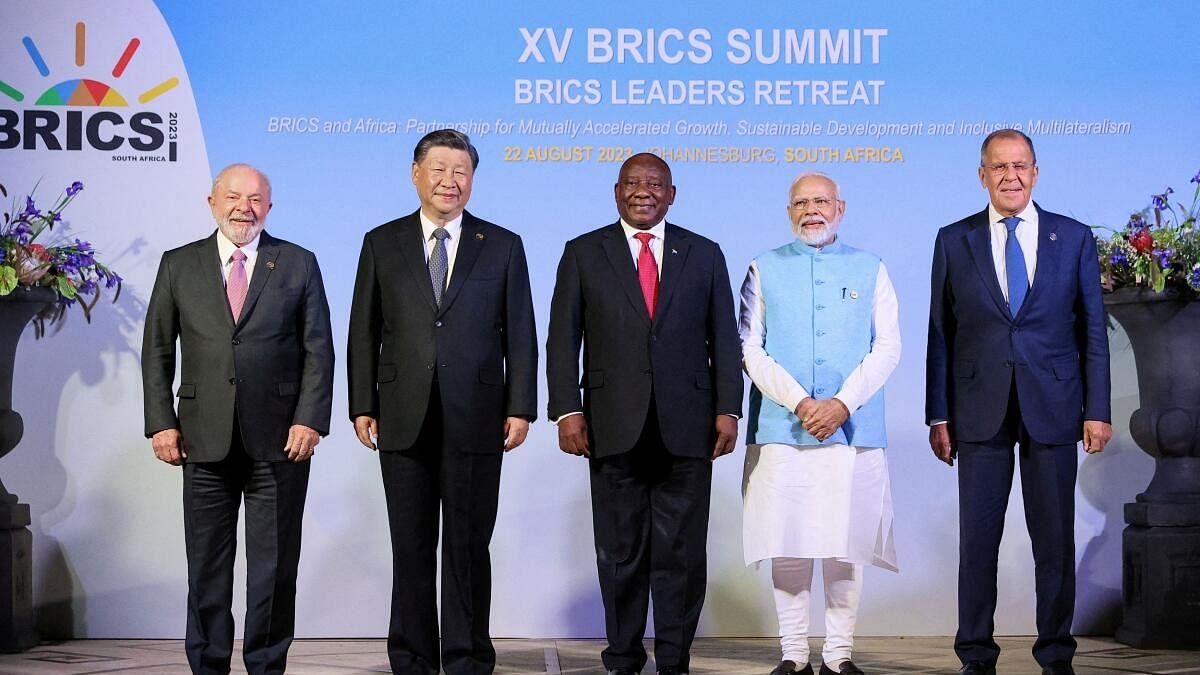
World leaders at the current BRICS summit.
Credit: Russian Foreign Ministry/Handout via Reuters
The 2023 BRICS (Brazil, Russia, India, China, South Africa) Summit is currently underway in Johannesburg, South Africa. Pre-Summit deliberations show that there are some unique and significant developments to look out for. One of them is the expansion of BRICS, which is set to be taken up for an elaborate discussion at the summit.
What is interesting about the expansion of BRICS to include new member countries isn’t just the novel acronym they would likely have to come up with, but also why over 40 countries have expressed interest to be part of it.
Ahead of the 2023 Summit, Saudi Arabia, the United Arab Emirates, Bahrain, Argentina, Algeria, Egypt, Iran, and Indonesia formally applied to be BRICS members. These countries have expressed interest despite all of BRICS' shortcomings; not to mention, there is a lot of scepticism regarding China’s sustained emphasis on expansion.
Analysts argue that other BRICS members — India, in particular — are wary of China using the expansion route to create a loyalist bloc of its own within the grouping. Similarly, both India and Brazil have advocated a cautious approach toward expansion, with India arguing in the Beijing Declaration at the 2022 Summit that there need to “clarify the guiding principles, standards, criteria and procedures for this expansion process,” with “full consultation and consensus.”
Why this interest in BRICS?
There are a few reasons why other developing economies may want to be part of the grouping. First is the prestige and brand name attached to BRICS. In 2022, Brazilian Minister for Foreign Affairs Mauro Vieira said that “BRICS is a brand and an asset, so we have to take care of it, as it means a represents a lot.” The statement sheds light on the value BRICS members assign to the organisation’s image as a representative of developing economies.
Naturally, countries in the Global South that are vying for a greater say in global governance may find membership of such a grouping attractive. For example, Mexico, which fears military intervention from the United States in its cartel wars, feels that being part of BRICS may eventually earn it a sense of security, while also fostering its global influence.
Second, there are multiple economic opportunities that accompany membership in BRICS. For example, new members may find it easy to access India and China’s large markets. They would also be able to access funding from the NDB and other intra-BRICS economic mechanisms such as the Interbank Cooperation Mechanism (ICM). Established at the 2013 BRICS Summit in Durban, the ICM allows member countries to settle payments and finance investments in local currencies.
Even the NDB has announced that as part of its 2022-2026 strategic cycle, 30 per cent of the bank’s total financing volume will be denominated in local currencies of its members.
For countries facing economic difficulties in the aftermath of Western sanctions against Russia amidst the war in Ukraine, and are otherwise subject to sanctions by the US and its allies (such as Iran), access to capital under such mechanisms may alleviate some of their woes.
Finally, there is a sense of equality between countries that comes with a BRICS membership. Because the grouping has a flat hierarchy, there is consensus and equal say on all matters, and any finalised decision is the best common minimum all member countries agree on.
Of course, with the inclusion of new members, the process will likely become more elaborate and complex; but decisions taken will also be more representative of the wishes of emerging markets and economies. It is precisely also this consensus-based decision-making that insulates the process of expansion from influence-peddling by Beijing or Moscow.
As the process of the grouping’s expansion is underway, India’s priorities would lie in making sure that principled guidelines are laid out to set benchmarks for membership, in creating space for consensus-building against the possibility of China’s influence-peddling, and in attempting to retain the image and brand value of BRICS as a community of developing market economies demanding more voice in global governance.
(Anushka Saxena is Research Analyst, The Takshashila Institution.)
Disclaimer: The views expressed above are the author's own. They do not necessarily reflect the views of DH.